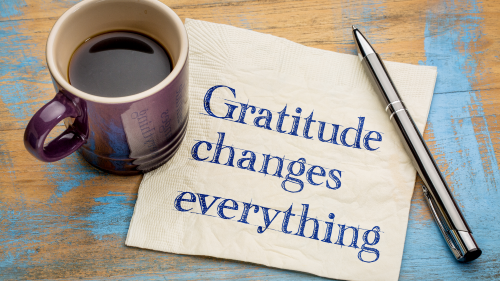
With the Thanksgiving holiday fast approaching, it seems appropriate to talk a little bit about the power of giving thanks and living a life filled with gratitude. It’s been a challenging year, to say the least, and I’m guessing that many people may have to dig a little deeper this year to find things to be grateful for. Maybe these notes will help.
Dr. Robert Emmons is an author, professor of psychology at the University of California, Davis, and the world’s leading scientific expert on gratitude. It’s his belief, based on his research, that the regular practice of living with a grateful attitude toward the good things in your life helps you get through the bad things better. Not only that, but he maintains that during hard times – such as pandemics and economic crises – gratitude is an essential trait that helps one roll with the punches.
In an article in Greater Good Magazine, Emmons puts it this way: “In the face of demoralization, gratitude has the power to energize. In the face of brokenness, gratitude has the power to heal. In the face of despair, gratitude has the power to bring hope. In other words, gratitude can help us cope with hard times.”
So how, exactly, does this work?
Emmons doesn’t say it’ll be easy. But it is possible to find gratitude in difficult times if we’re able to change our focus from what we’re missing in our lives to what we have. Being thankful for the good makes us feel better, even if only temporarily. Our feelings tend to follow our mental outlook on life, so when we focus on the good, we close the gap between mind and heart. And that decrease in space is what helps us get through a crisis.
Says Emmons, “Consciously cultivating an attitude of gratitude builds up a sort of psychological immune system that can cushion us when we fall. There is scientific evidence that grateful people are more resilient to stress, whether minor everyday hassles or major personal upheavals.”
Here’s Where to Start
Emmons notes that a good place to start this process of living gratefully is by remembering a bad experience you’ve had in the past – a breakup, a betrayal, a loss, etc. Focus on it for a few minutes, and feel the negative emotions associated with it. Then pull your focus back to the present. Here you are. You made it through that experience, and chances are good that you have something in your life that you’re grateful for now. Maybe it’s only gratitude that that phase of your life is over. But that’s a start. Looking back helps you remember; looking at the present helps you move forward. The contrast helps you develop a sense of gratitude.
According to Emmons, another way to help foster gratitude is to confront your own mortality. Thinking about your demise makes you more thankful for everything you currently have. I can say from experience that this works. I was forced to do this very thing two years ago when my heart started shutting down on me. I’m grateful that I had such a fantastic team of doctors to tend to me at the time. Now, while I’m waiting for a new heart, I find my old heart full of love and gratitude for everything I have – my wonderful kids, an amazing fiancee, a supportive network of family and friends, a successful business, and a strong faith that everything will be okay.
Reframing the Situation
If you’re struggling to find things to be grateful for this year, Emmons suggests reframing your situation using the language of thankfulness. Look at adverse events and ask yourself the following questions.
- Am I learning any lessons from this experience?
- Can I find ways to be thankful for what’s happening, even though I’m not sure how things will turn out?
- Is this experience drawing anything unexpected out of me?
- Is this experience in some way making me more of who I want to be?
- Are negative feelings about this experience limiting or preventing my ability to feel gratitude in the now?
- Will this experience remove a personal obstacle that’s preventing me from feeling grateful?
As you celebrate Thanksgiving next week – in whatever way works for you this year – try keeping these points in mind. There’s always something to be grateful for, even if it’s just a turkey dinner.
Have a Happy Thanksgiving, everyone. Stay safe.
To read Dr. Emmons’s article, How Gratitude Can Help You Through Hard Times, click here.